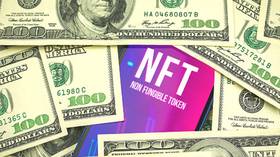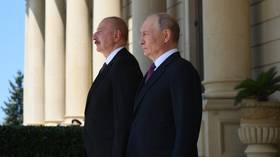Ukraine to issue NFTs to fund army

Kiev is imminently to begin issuing non-fungible tokens (NFTs) to raise funds for its armed forces amid the continued Russian invasion, Ukrainian Digital Transformation Minister Mykhailo Fedorov said on Twitter on Thursday.
The government has opted for NFTs instead of fungible tokens such as airdrop – a free digital token used to encourage participation in a cryptocurrency project – Fedorov added. He provided no further details about the type of NFTs it plans to issue, nor did he elaborate on when they would be available, saying only that it would happen “soon.”
NFTs confer the ownership of a digital item on to a buyer, even if the item itself can be easily copied, and ownership is recorded in a blockchain ledger. NFTs have recently been particularly popular when it comes to owning works of virtual art.
After careful consideration we decided to cancel airdrop. Every day there are more and more people willing to help Ukraine to fight back the agression. Instead, we will announce NFTs to support Ukrainian Armed Forces soon. We DO NOT HAVE any plans to issue any fungible tokens
— Mykhailo Fedorov (@FedorovMykhailo) March 3, 2022
Kiev has urgently been exploring new avenues of funding. Last Saturday, Fedorov said it had begun accepting donations in cryptocurrency, including ethereum, bitcoin and tether. That move had reportedly garnered $54.7 million, UK daily The Guardian has said, citing information provided by blockchain data and analytics company Elliptic. Most funds were donated direct to the government, with a smaller amount being received by the NGO Come Back Alive, which says it is crowdfunding to meet Ukraine’s “defense” needs.
Ukraine has seen more than 102,000 cryptocurrency donations to date, including a $5.8 million donation by Gavin Wood, the co-founder of the blockchain platform Polkadot, according to Elliptic.
The Ukrainian government has also deployed more traditional means of fundraising, including issuing war bonds. Those have already helped it raise additional $264.42 million. It is currently in talks with the International Monetary Fund and World Bank regarding an emergency financial aid package.
Meanwhile, people in Russia and Belarus have seen their cryptocurrency assets frozen and accounts suspended by several major trading platforms, including Ukraine’s Qmall and the US-based Dmarket. Some restrictions were also imposed by BTC-Alpha, Kuna, and CEX.io.
❌ We are blocking the accounts of citizens of the Russian Federation and Belarus due to active military actions of the armies of these countries on the territory of Ukraine! All the assets of 🇷🇺 and 🇧🇾 users ARE BLOCKED! #CryptoNews#UkraineRussiaWarpic.twitter.com/leAdabjP4I
— QMALL.exchange (@QMALL_Exchange) February 27, 2022
Dmarket and Binance – one of the most popular platforms – have said they will donate $4.5 million and $10 million respectively to support the Ukrainian Army.
Moscow invaded Ukraine on February 24, with the expressed aim of protecting the people of the two breakaway Donbass republics, Donetsk and Lugansk, the sovereignty of which Russia recently officially recognized. The move has sparked a wave of outrage among Western nations and prompted an unprecedented raft of sanctions to be imposed on Russia.













